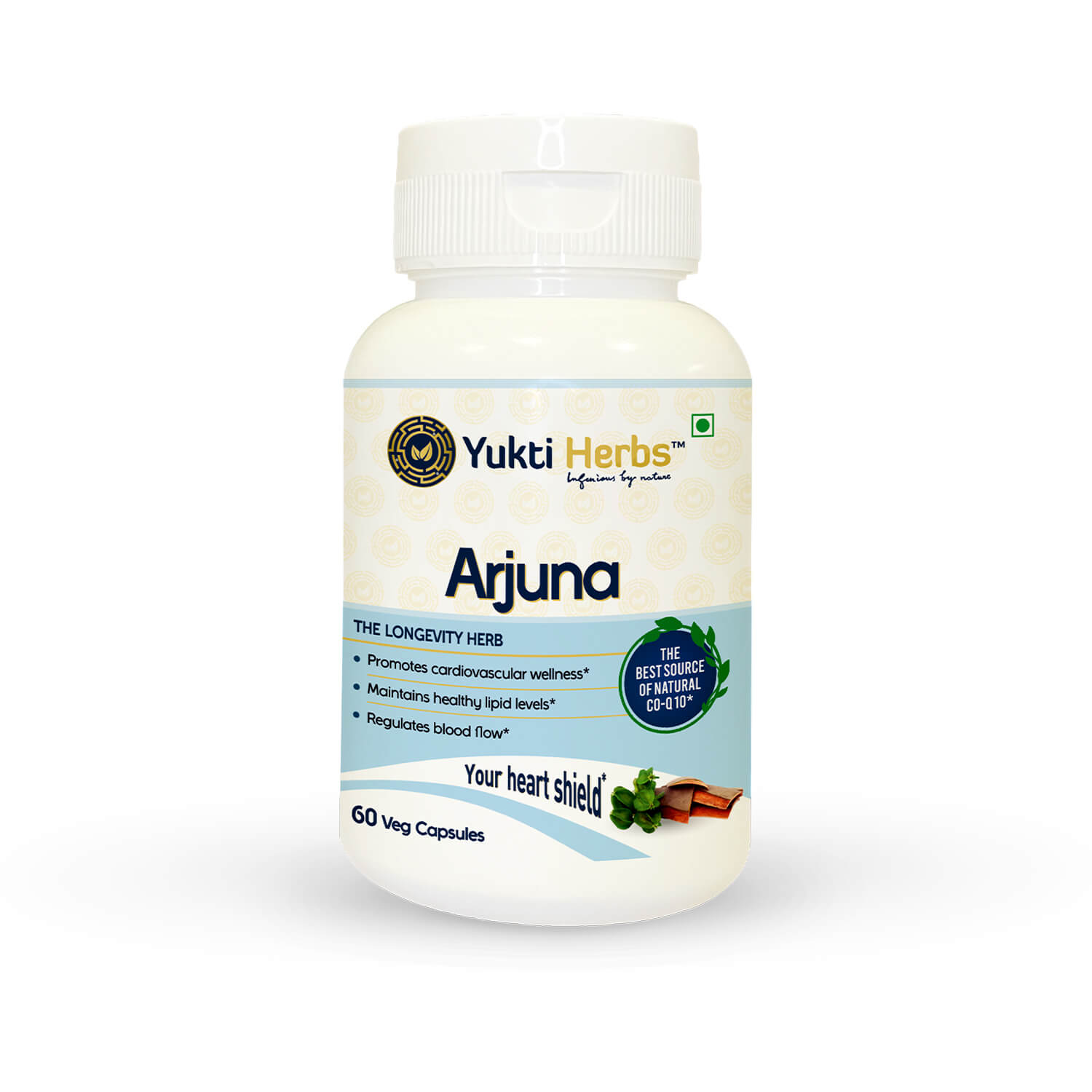Arjuna Introduction/Abstract
Arjuna is a well-known herb that is commonly used in Ayurveda for treating heart diseases. It is aptly called the ‘Heart Herb’ because of its proven ability to manage heart functions.
Arjuna has been in use as an excellent Ayurvedic remedy for heart health since the Vedic era. The use of Arjuna herb in India dates back to more than 3,000 years. The benefits of Arjuna in managing heart ailments have been mentioned in several medicinal texts of ancient India. Some of these texts include Ashtang Hridayam, Charaka Samhita, and Sushruta Samhita.
Owing to the time-tested effectiveness of Arjuna in treating heart disorders, the herb is also described as the ‘Guardian of Heart’. Arjuna herb can strengthen the cardiac muscles and ensure optimum heart health. It offers protection to the heart by working as a ‘heart shield’ in three ways:
- promotes cardiovascular wellness
- maintains healthy lipid levels
- regulates blood flow.
Arjuna Synonyms
Arjuna herb comes from the Arjuna tree, which grows widely across the Indian subcontinent. The tall, multi-purpose Arjuna tree belongs to the Combretaceae family. The tree is traditionally known for its properties as a cardiovascular stimulant.
The scientific name of Arjuna is Terminalia arjuna. The herb is also known by some other names which include:
- Arjon
- Arjun Gach
- Bilimatti
- Dhavala
- Nadisarja
- Nirmasuthu
- Neermatti
- Kakubha
- Kellemasuthu
- Murudam
- Pandava
- Partha
- Phalguna
- Sadado
- Sajada
- Svetavaha
- Veerantaka
- Vellamaruthi.
Arjuna Habitat
The entire Indian subcontinent region is the natural habitat of Arjuna tree. The tree is generally found growing in the marshlands of the sub-Himalayan region of India and neighboring countries. The tree can grow in nearly all kinds of soil. However, the best soils in which the tree can survive are humid, red lateritic and fertile loam soils.
In India, Arjuna tree is widely grown along the streams, riverbanks and dry waterbeds in Uttar Pradesh, Bihar, Madhya Pradesh, Odisha, Maharashtra, West Bengal, and South India.
Besides India, other habitats of Arjuna tree include Burma, Indonesia, Malaysia, and the forests of Mauritius and Sri Lanka.
Arjuna Parts used
All the parts of Arjuna tree hold immense medicinal significance because of the presence of some essential elements which can support heart health. The parts of Arjuna tree used for medicinal purposes include:
- Bark
- Leaves
- Roots.
The reddish bark of the Arjuna tree is more beneficial in Ayurvedic medication as compared to the other parts. The bark oozes out a white sap upon being cut. The sap contains ‘Arjunine’ essential alkaloid and other useful phytoconstituents. The advantages of Arjuna bark were first discovered by Indian Ayurveda advisor Vagbhata who used the bark for treating heart disorders.
Arjuna Medical Properties
Arjuna has traditionally been used as a heart herb because of its antioxidant cardiovascular properties. Some of the prominent bio-active compounds present in Arjuna include triterpenoids, flavonoids, glycosides, β-sitosterol, ellagic acid, gallic acid, tannins, cardenolide, and oligomeric proanthocyanins. In addition, Arjuna also contains some useful mineral/trace elements like aluminum, copper, calcium, zinc, magnesium, and silica.
The presence of useful compounds and minerals gives Arjuna the following medical properties:
- Cardiotonic
- Antioxidant
- Anti-ischemic
- Astringent
- Analgesic
- Antiatherogenic
- Antihypertrophic
- Anti-inflammatory
- Anti-microbial
- Anti-dysenteric
- Demulcent
- Expectorant
- Inotropic
- Styptic
- Hypolipidemic.
Arjuna Ayurvedic Properties and Effect on Vata, Pitta, Kapha
The Ayurvedic properties of Arjuna can be described as follows:
- Rasa (Taste) – Kashaya (astringent)
- Guna (Quality) – Laghu (light) and Ruksha (dry)
- Virya (Potency) – Sheet (cold)
- Vipaka (Metabolic property, after digestion) – Katu (pungent or acrid)
Arjuna has an overall cooling effect on bodily processes and has heart-supporting qualities.
Arjuna has a balancing effect on the three doshas – Vata, Kapha, and Pitta. It can treat disorders resulting from the deficiency of these doshas. More specifically, Arjuna has the ability to pacify Pitta and Kapha. It can particularly relieve the excess of Kapha in the lungs. However, over-use of Arjuna can sometimes have an aggravating effect on Vata.
Arjuna Uses and Benefits
Arjuna can reduce the risk of heart disease. The use of Arjuna is very effective in managing heart-related problems like angina (chest pain), palpitations, congestive heart failure, and high blood pressure. It can increase the levels of good cholesterol (HDL) by lowering the levels of bad cholesterol (LDL) and triglycerides. It improves the flow of blood in the body and prevents damage caused by free radicals to the muscles and blood vessels of the heart.
Besides managing cardiac ailments, Arjuna can also cure a wide range of other health conditions including:
- Liver disorders
- Leucorrhea
- Anemia
- Hypertension
- Osteoarthritis
- Edema (fluid retention)
- Urinary tract infections
- Lung problems like Asthma and Bronchitis
- Kidney disorders like Uremia
- Mouth ulcers
- Diarrhea
- Bleeding piles
- Indigestion
- Ear pain
- HIV infection
- Hemorrhages and wounds
- Fever
- Inflammation
- Infertility
- Menorrhagia and other bleeding disorders
- Skin problems like Psoriasis, Eczema, and rashes.
Arjuna Dosage
Arjuna is available in the form of tablets, capsules, and powder. Regular use of Arjuna is beneficial for cardiovascular health and a number of other problems.
The recommended dosage of Arjuna for adults is as follows:
- In tablet or capsule form: 1-2 tablets or capsules twice a day, with plain water.
- In powder form: 1-3 gm of the powder boiled with water or milk, twice a day.
Arjuna Contraindication
Arjuna can be used safely for maintaining heart health and managing several other disorders. It is advised that children under the age of 14 years, pregnant women, and breast-feeding mothers should not take Arjuna.
Arjuna Side Effects
Arjuna is, by and large, a safe Ayurvedic medicine for all adults. There have been no reported side effects when Arjuna is taken as per the recommended dosage.
Conclusion
Arjuna is an incredibly beneficial and safe-to-use medicinal herb because of the pharmacological actions of its chemical constituents. It can improve heart health, enhance the functioning of the liver and gallbladder, strengthen the bones, prevent aging, improve insulin sensitivity, treat digestive imbalances, and boost the immune system. Ayurvedic practitioners recommend the use of Arjuna chiefly for the natural management of cardiac problems.












